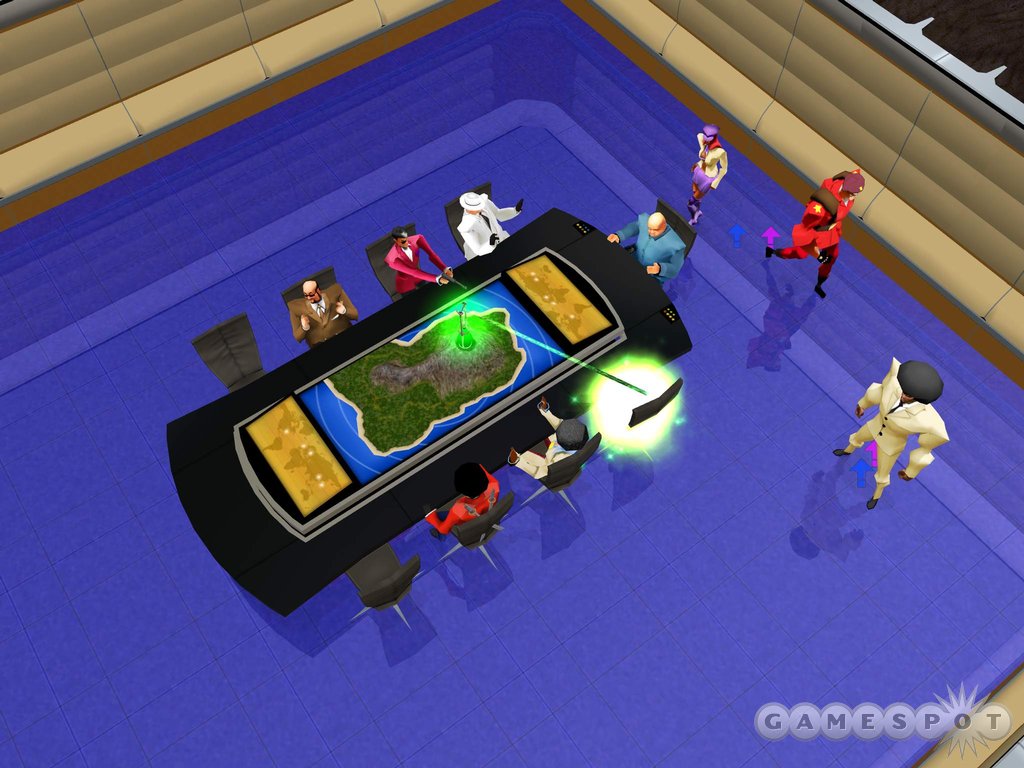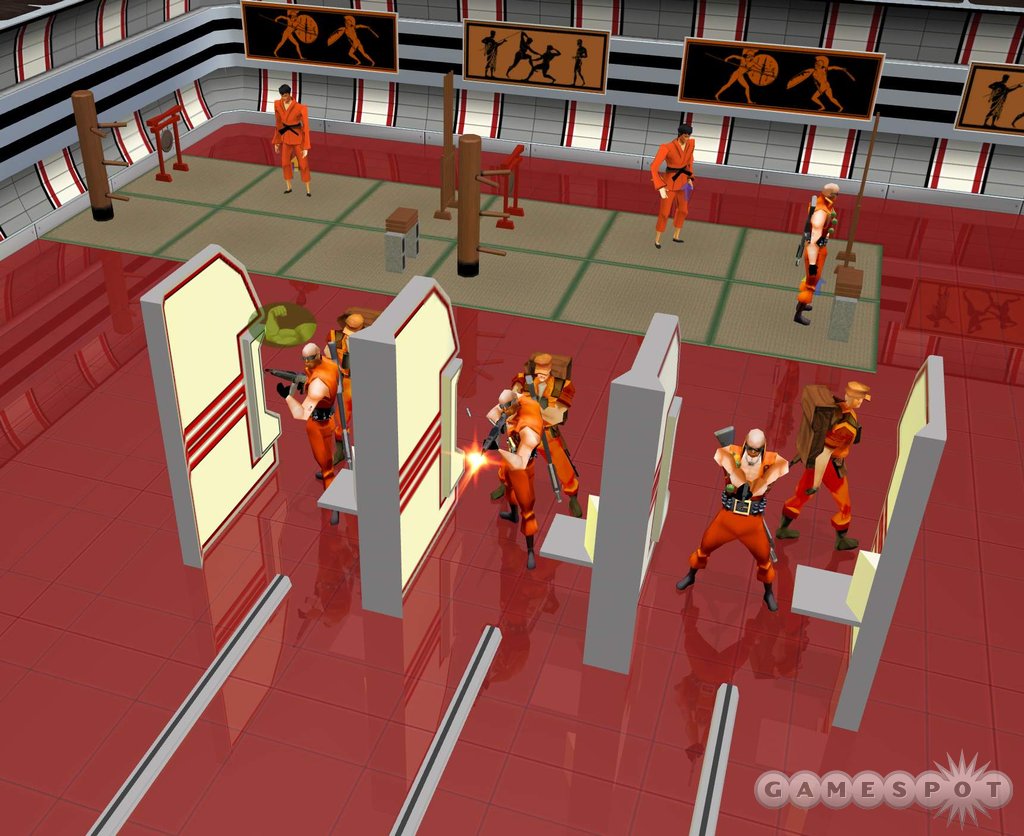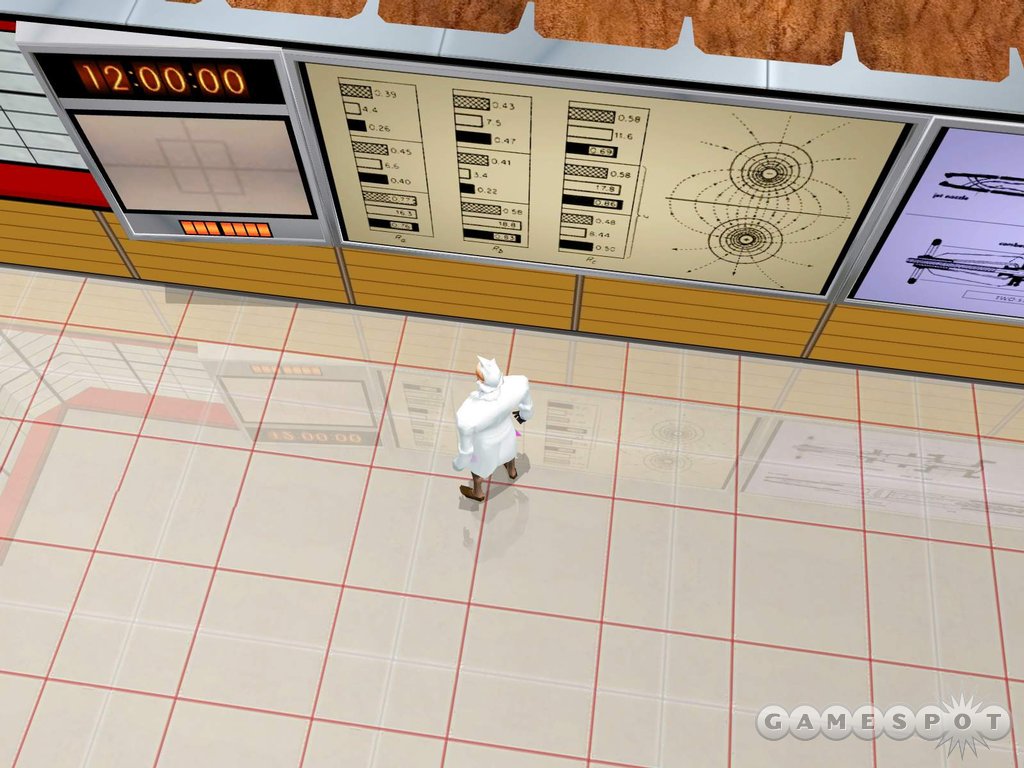Evil Genius Designer Diary #5 - Final Thoughts
Producer Pete Gilbert and executive producer Adrian Bolton share their final thoughts on the development of Elixir Studios' unusual strategy game.
While some strategy games let you build a bustling city full of peaceful citizens you'd want to keep happy, Elixir Studios went a slightly different route with its recently completed game, Evil Genius. In the game, you play as a criminal mastermind right out of an over-the-top 1960s spy film, complete with a secret underground lair, a taste for pulling off daring heists for precious valuables, and not much love lost to those infernal superspies (and their gadgets and resourcefulness). The game was recently completed, and producer Pete Gilbert and executive producer Adrian Bolton have graciously agreed to share their thoughts on the last days of development.
By Pete Gilbert / Adrian Bolton
Producer / executive producer, Elixir Studios

The last few weeks of game development are always exciting. Actually the word "exciting" is probably not appropriate. Perhaps a better way to describe it is "unbelievably stressful." The evil things that the evil team are working on at the moment are first, finishing the game; second, creating assets for public relations and marketing; third, reviews; and fourth, the future.
As far as finishing the game goes, as we look around the office, people are playing the game, taking screenshots, and working on materials for magazines. There are no raised voices, no red faces, only calm and order...it seems like Evil Genius is going to go gold with no histrionics at all--which is nice.
This week we submitted our gold master candidate. There are no bugs, all the content is there, and the game is fun, playable, and full of depth. The team has just finished all of its polishing. Frankly, we have never been involved in a development cycle that's been so intense and controlled at the same time. It's fantastic, but it's all a bit...spooky.
So how has this happened? We would love to say it's due to great production techniques, but we think that might be a scandalous bit of libel. The real reason is the exceptionally talented team we have working on the game. Looking back through the course of development, the design of Evil Genius has evolved, but has never changed radically. The tools and technology were working very quickly and this let us build on a stable foundation. With a solid design comes a solid schedule. With a solid schedule you can plan deliverables that impress people with their quality and their punctuality, which in turn keeps your publisher happy and (more importantly) confident enough to allow development to continue without unnecessary hindrance.
Good game development practices don't necessarily make great games, but they do help make already-great games come out on time. The key to developing original products successfully is getting your features playable early. Track how development is going. If it's running behind schedule, decide which of the remaining features are the most important to implement, and then reorder your schedule so they are completed first. This assures that the most fun ones get into the game with time to be polished. Continue with this flexibility throughout development, because what was thought to be the most fun parts of the game on paper invariably change once played.

With the game playable from an early stage, we dedicated a lot of time and effort to focus testing. We brought in countless people to play the game under the watchful eye of our lead designer. When we first focus tested the game in November 2003, many people struggled with the tutorial and the first objectives. This surprised us all. It seems obvious, but when you have worked on a project for two years, you know everything there is to know about playing the game; but when a person sits down for the first time with little or no knowledge, you have to rely solely on the game to explain itself to the player.
After multiple revisions, all testers in the past three months have managed to easily complete the tutorial and the first three objectives.
We were very lucky with Evil Genius that 90 percent of all the features initially specified made it into the game. This provides a very rich environment with a precise "backbone" to the game, but a freedom to play in various ways.
In terms of creating assets for public relations and marketing purposes, the Evil Genius production team has had years of experience in the industry. Nevertheless, the one thing that never ceases to amaze us is the unpredictable requests for materials via the publishers' public relations and marketing departments. What you realize over time is that a lot of factors determine what promotional materials will be needed for a game: how good the game is, how excited people are about the game, and probably the most difficult to assess--what other games are actually coming out and vying for attention at the same time.
So what years of experience tells production is not to rely on second-guessing what promotional materials will be needed, but to organize the final stages of the project so that the team has enough flexibility to fulfill those last-minute requests for magazine covers and artwork.
A great example of this is the Evil Genius demo. Initially requested was a 200mb cover-mount. We were then asked for a stand-alone demo. Then a localized version...of each. In the end, we just made every permutation and combination we could think of and submitted them to the publisher to test. To be honest, these things happen. The more hype a game generates, the more assets are required and it's impossible to predict who will want what when.
And now for the most stressful time on the project: waiting for review scores from review publications--just waiting to see whether the reviewers like what we have created. Did we get the pacing right? This is notoriously difficult with simulation games. How will people play it? All-out aggressive or thoughtfully subversive? But we have worked hard to make the game very accessible for the beginner and challenging for all at the end, so we are pretty confident about this.
Will they find the game funny? Universal humor is very tricky. What we, the development team, think is amusing might be completely lost on the end user. Thankfully, all pointers throughout the focus testing and presentations of the game have indicated that people think it's very funny indeed. Which is a relief, as it's a fundamental part of the game. Hopefully Evil Genius will be regarded as a great game. But, we'll just have to wait and see what the reviews say. We are quietly confident.

And looking to the future, throughout the two-and-a-half-year life of Evil Genius, the whole team has become incredibly focused--some might say obsessive. Their lives have become intertwined with Evil Genius' schedule. Team members often arrange their holidays, weddings, and even babies to coincide with lulls in the development or the end of the project. When the project is complete there is an "awakening" point, where everyone can't quite believe it's over and they want to know what they are doing next.
We are currently planning the next projects. We will stick to the same formula: a talented team who sets goals that they stick to (ambitious but feasible), a team who sets sensible milestones with the publisher, and a team who gets people to work efficiently in the hours that they are in the office.
The final stage to a game is beginning to happen now. We can see it as we type this. Everyone's subconscious will realize they have been concentrating very hard for years, but now they can relax. Their bodies will demand rest and recuperation. Now!
Evil Genius has accomplished its purpose. With Republic: The Revolution, our company proved that a start-up company could deliver an ambitious debut game. With Evil Genius, we have proven that we can also deliver on time. And now it's...nearly...time...for...sleep...
Got a news tip or want to contact us directly? Email news@gamespot.com
Join the conversation